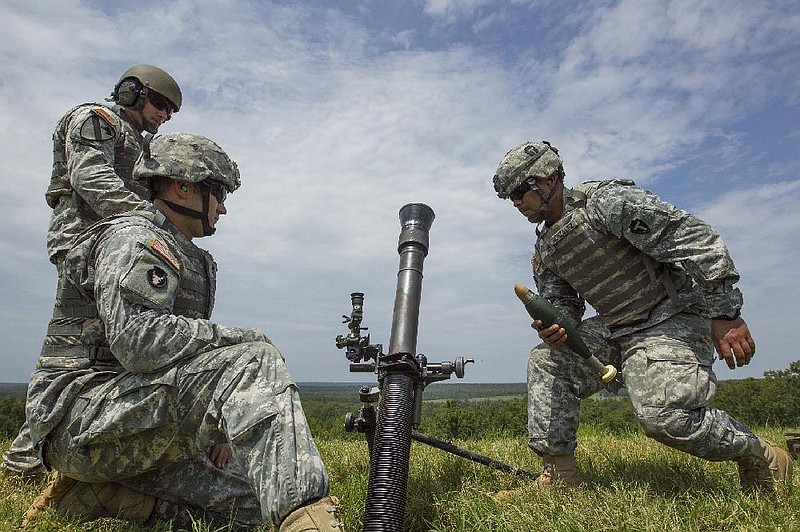At least 20 soldiers are in a state of limbo as state and federal officials attempt to formalize training requirements for Arkansas National Guard members under federal orders.
The federalized soldiers, who serve at the National Guard Professional Education Center at Camp Robinson in North Little Rock, have received limited extensions to continue their work while talks continue, said Lt. Col. William Phillips, a spokesman for the Arkansas National Guard on Friday.
"Basically, they're going to continue on with their jobs temporarily while we work this process out," said Phillips. "Once we get everything worked out, we'll be back to business as usual."
The Professional Education Center has agreed to a 45-day work extension for the soldiers, who generally require releases from the adjutant general of the Arkansas National Guard to serve under federal orders. The extensions will begin at the end of the month when the soldiers' current releases are set to expire.
Soldiers at the Professional Education Center serve important roles as instructors for the guard's full-time force. The center trains guard members from around the U.S. including recruiters, IT staff and training management officials. The center also hosts conferences.
"It's basically what I would call the National Guard bureau south in layman's terms," said Phillips. "They perform a lot of the administrative and training functions that are needed to make sure that we provide a trained and ready full-time force."
Phillips wasn't sure how long it would take state and federal officials to sort out the inactive duty training requirements, an issue that the Arkansas National Guard's top brass worry could affect the readiness of state units.
While Arkansas National Guard members under federal orders are allowed to voluntarily participate in training with state units, they're not required to do so. For guard members serving under temporary federal orders, the potential lack of training means they could return to state duty without the skills they need to support their units, said Phillips.
"Pilots have to get sets and reps behind the stick in their helicopters, our IT folks need to get sets and reps working with computers, our command folks who are in the infantry and field artillery they have to get a chance to lead soldiers so when it comes time, when the governor calls us to help Arkansans or when the president calls on us to help our fellow U.S. citizens, we're ready," said Phillips.
Informal agreements allowing federalized guard members to participate in training with state units also blur the lines when it comes to the chain of command. If a federalized guard member were to strike someone while training with their state unit, for example, the unit couldn't take administrative action against the offender, said Phillips.
The agreements also raise questions about which entity would issue awards and conduct evaluations for the federalized guard members.
If state and federal officials are not able to come to an agreement by the end of the 45-day extension, Phillips expected the Arkansas National Guard and the Professional Education Center would "come up with a solution that helps both parties."
"This isn't about punishing soldiers," said Phillips. "This isn't about making life difficult for these individuals."
While Phillips said other federalized Arkansas soldiers would likely be affected by the talks, he said those at the Professional Education Center are largely unique in that they're serving under federal orders within Arkansas.
Phillips said he was not tracking the airmen that could be impacted by the decision.
Discussions over the training requirements began this summer. Although the informal training agreements have plagued the Guard for years, Phillips said no particular incident spurred top brass to take action now.
"There's not really a driving force, it's more of we always seek to improve our organization through every iterative process," he said.
